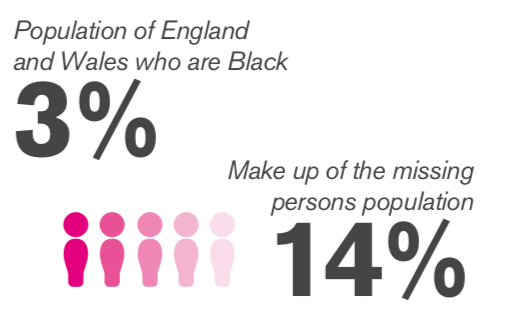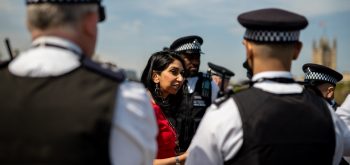Black people are disproportionately represented in ‘missing’ reports to the police, comprising 14% of the overall missing persons population, according to new research. The report by the charity Missing People has found that racial discrimination has a major impact in subsequent investigations.
The number of people who have died whilst missing reached an all time high of 955 in 2019/2020, a steep rise by over a third since 2016 (34%). The research also revealed that confidence in the efficacy of police investigations was lowest amongst black communities, making note of the anxieties confronting affected individuals. However the report concluded that the concerns of people of colour must be recognised as being largely ‘distinct from these broader frustrations’.
The families involved suggested that people of colour are ‘more likely to be assumed to be taking part in criminal activity’ or making ‘poor life choices’ instead of being viewed as vulnerable. Others reported that they were interviewed ‘like criminals’ as if they had something to do with their child’s disappearance, something they feel wouldn’t have occurred if they were white.
Police officers spoke out about discrimination. ‘As one of very few minority police officers, I usually ended up dealing with BAME missing persons and/or their families,’ one officer told researchers. ‘White officers would generally do computer checks and leave it at that. Supervising officers would mark up and falsify records to show enquiries were being made.’
‘Children missing from secure homes were not given the priority,’ the continued. ‘Vulnerable people were not given the priority. When it came to a white family, senior officers and the press would get involved. More checks were done, as [was] more door knocking. There was a stark difference.’
A major finding of the report also related to the lack of media coverage of missing people of colour. It touched on what was labelled ‘missing white woman syndrome’, the phenomenon of the media’s extensive coverage of ‘white, often middle-class, women and girls who have gone missing’ and relative lack of coverage of missing persons from minoritized and disadvantaged backgrounds.
The report concluded that the police should implement specialised training to target racial discrimination. A police officer alleged that ‘white officers would generally do computer checks and leave it at that’ and ‘supervising officers would mark up and falsify’ findings in cases of people of colour. Despite this, the Met have not acknowledged race as a factor in the handling of missing person investigations. An investigation into the recent tragic case of Bibaa Henry and Nicole Smallman found that the Met failed to follow its missing persons policies, and the service the family received from the police was ‘unacceptable’. However, it did not find racial bias to be a factor in the mishandling of the case’. The mother of the women, as well as three ex-senior officers, challenged that view.







